This easy Kimchi recipe will teach you to make authentic Kimchee at home. It’s easy to do with these simple steps!
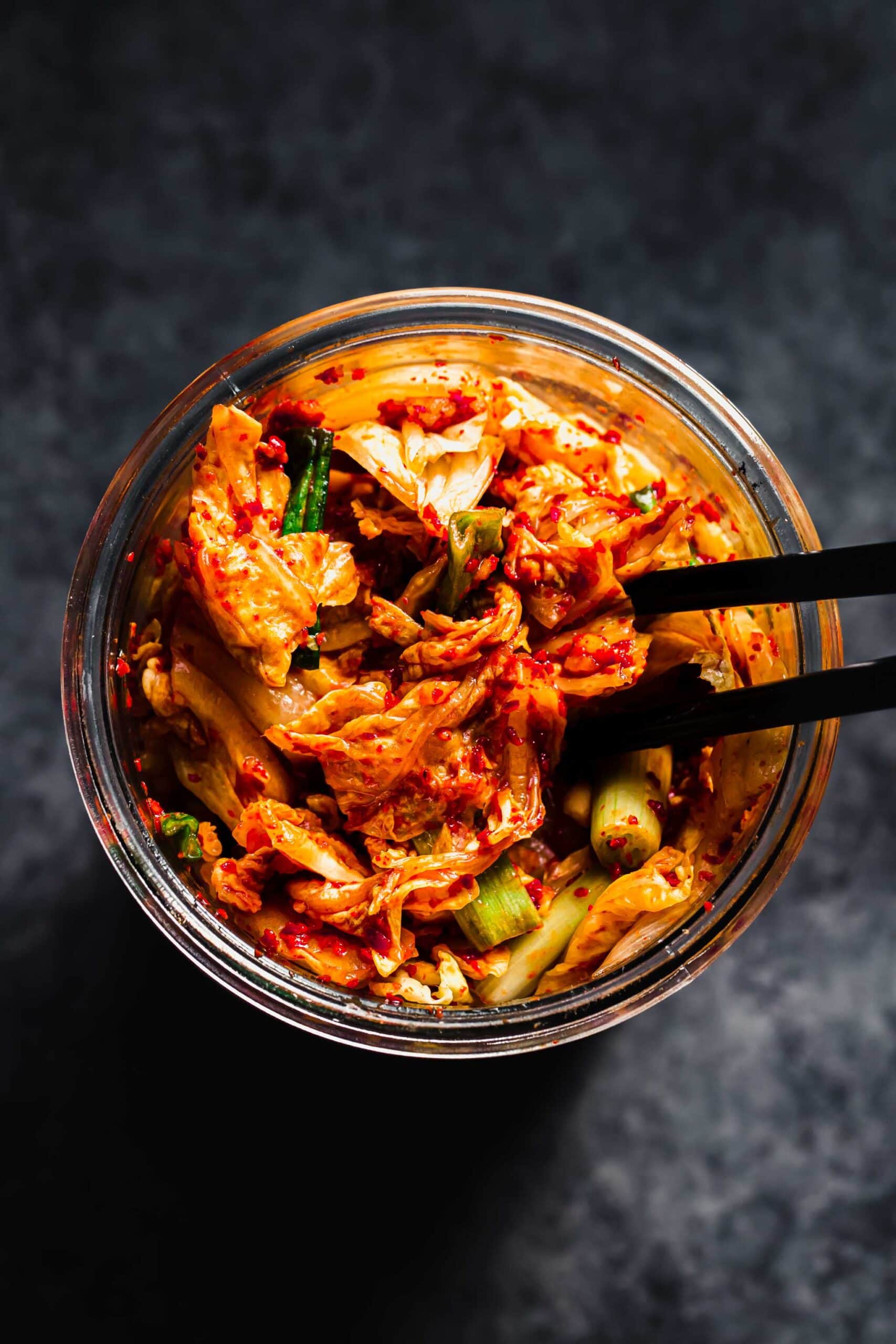
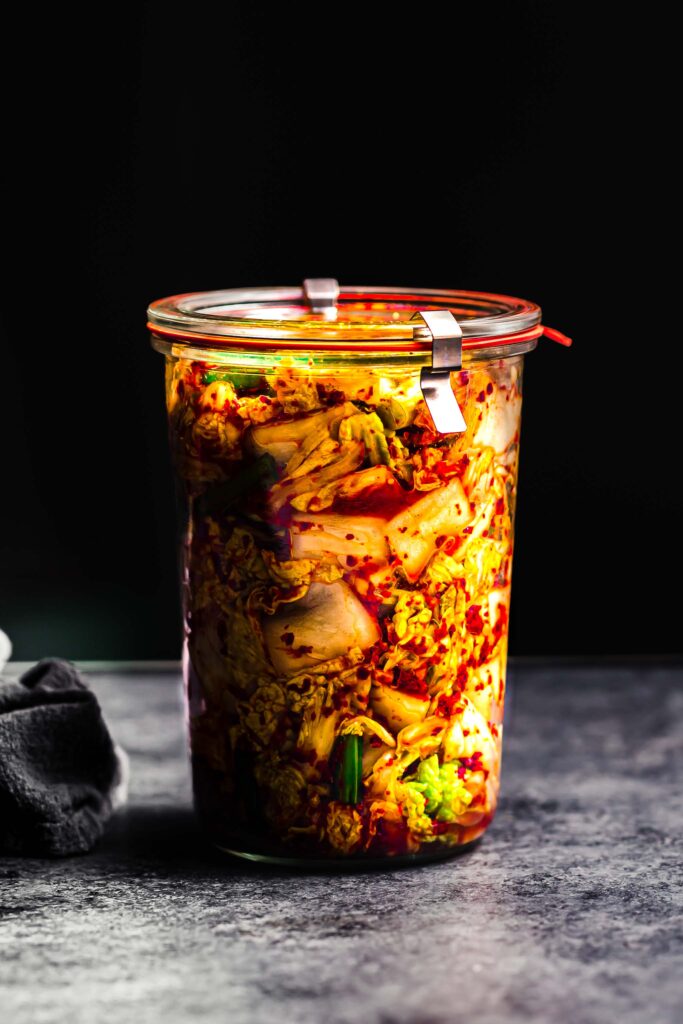
What is Kimchee?
Kimchee is a traditional Korean dish of fermented vegetables, the most common of which are napa cabbage and daikon radish.
Kimchee is actually the national food of Korea. And, it should be noted that the proper spelling of kimchi is “kimchee.” In this post, I occasionally refer to it as kimchi, but that is the Japanese spelling for this beloved Korean dish.
In addition to being served as banchan, Korean side dishes presented as part of a meal, it can also be used in a variety of cooked dishes like kimchi fried rice or kimchi quesadillas.
I love topping these Korean (Bulgogi) Beef Tacos with it – they’re amazingly delicious!
The ingredients in kimchee will give you an excuse to check out your local Asian market. I had so much fun tooling around my local store and trying to figure out what everything was.
There are so many fresh and exotic ingredients. I could spend hours just looking around and soaking everything in.
If you don’t have an Asian market near you, I’ve included some links below.
🌟 All of the specialty ingredients can be ordered off of Amazon. 🌟
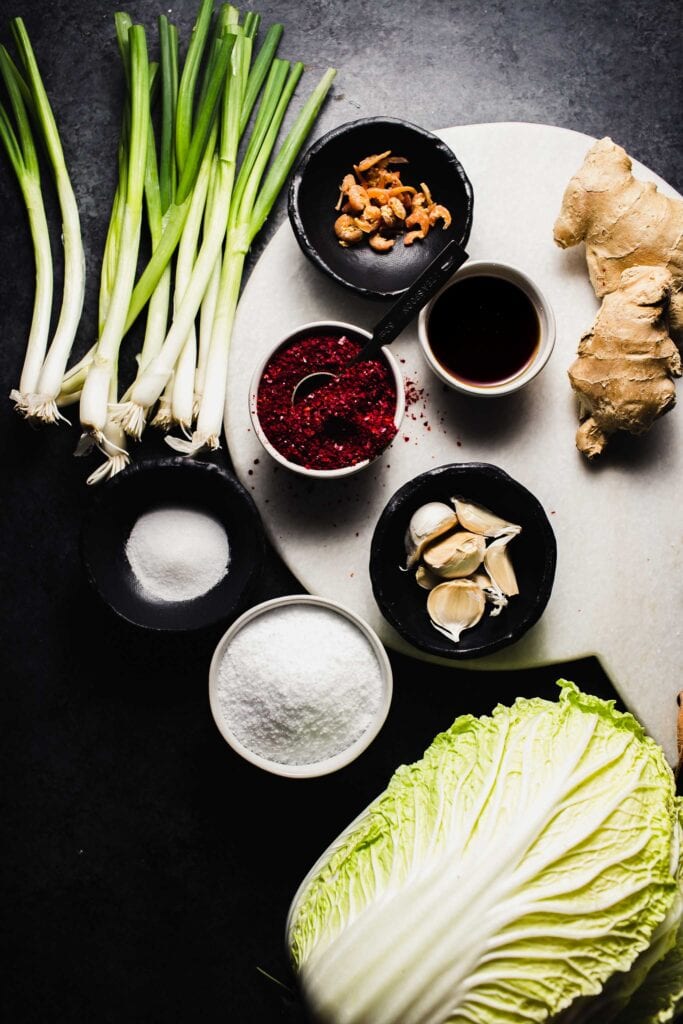
Kimchi ingredients
- Napa cabbage
- Salt + Sugar
- Scallions
- Fresh Ginger & Garlic
- Korean Red Pepper Powder – Or, kochukaru, is what gives kimchee its spiciness. It can be found in Korean markets in large resealable plastic bags, in different grades of coarseness and spiciness. Choose a grade based on your personal preference.
- Fish Sauce – This is my favorite brand.
- Dried Shrimp – Also known as saeujeot, Korean salted shrimp are very small, naturally fermented shrimp that impart authentic flavor to kimchi. They are sold in jars and can be found in the refrigerator case of Korean markets.
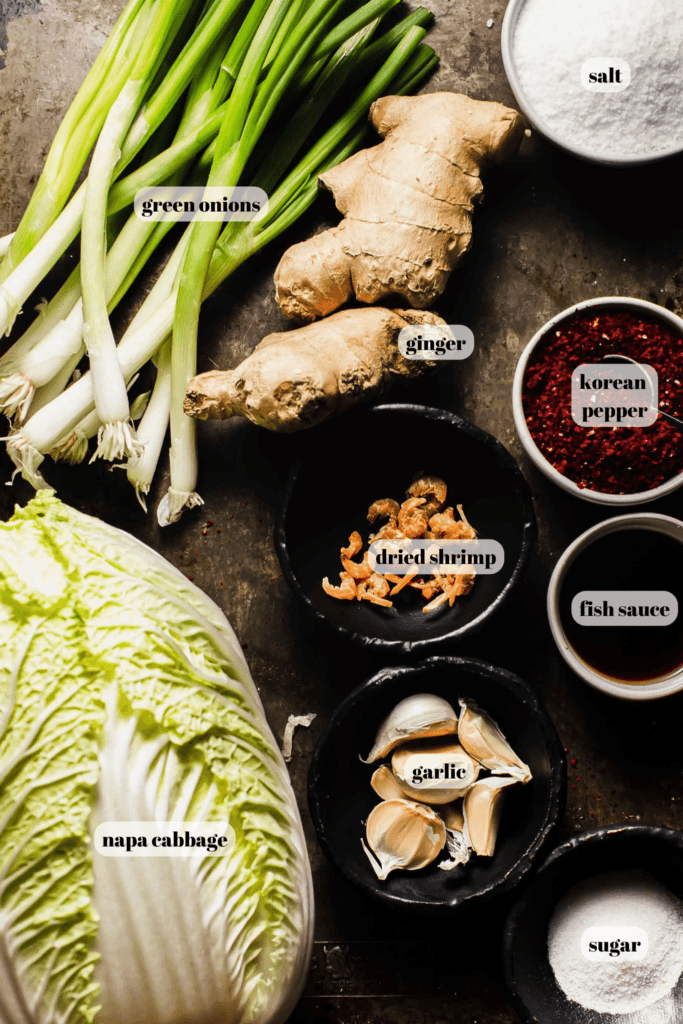
How to make it
Plan Ahead: Kimchi needs time to ferment, so I would recommend starting a batch about a week before you plan to use it. It will last about a month in the refrigerator.
- Cut the cabbage in half lengthwise, then crosswise into 2-inch bite-sized pieces, discarding the root end.
- Place the cabbage in a large bowl, sprinkle with the salt, and toss with your hands until the cabbage is well coated with the salt.
- Add enough cold water to just cover the cabbage (about 12 cups). Cover and let sit at room temperature at least 12 hours (up to 24 hours).
- Drain the cabbage and rinse it well with cold water. Gently squeeze out the excess water.
- Place the remaining ingredients in a large bowl and stir to combine.
- Add the cabbage and toss with your hands until evenly combined and the cabbage is thoroughly coated with the mixture.
- Pack the mixture tightly into a glass jar with a tight fitting lid and seal.
- Let the kimchi ferment for 24 hours (the mixture may bubble).
- Open the jar to let the gases escape, then reseal and refrigerate at least 48 hours before eating (kimchi is best after fermenting about 1 week).
- Refrigerate for up to 1 month.
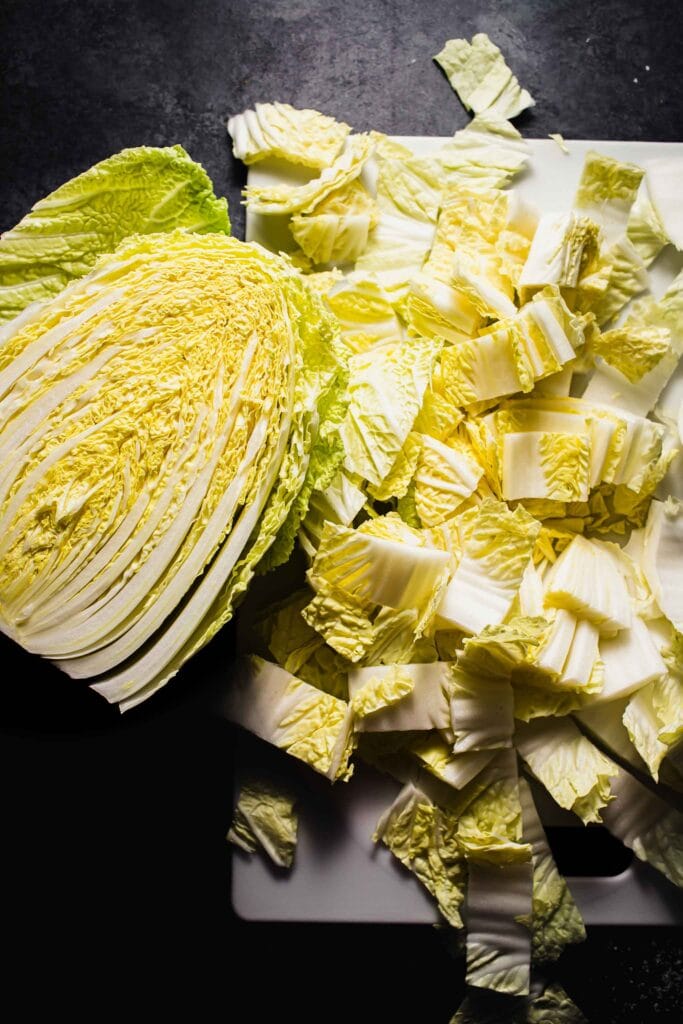
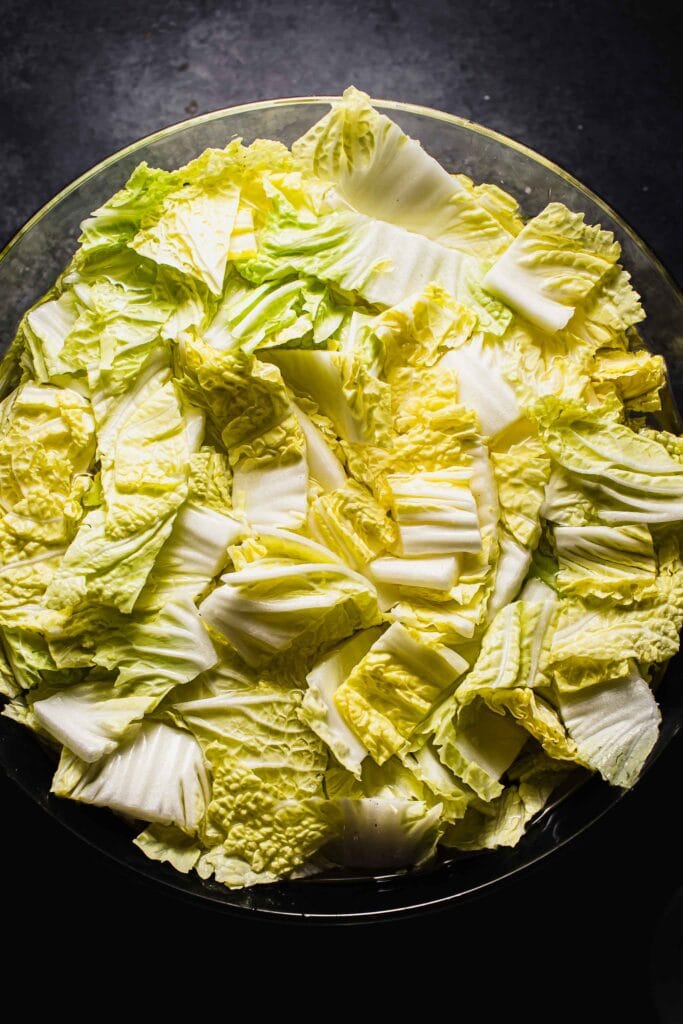
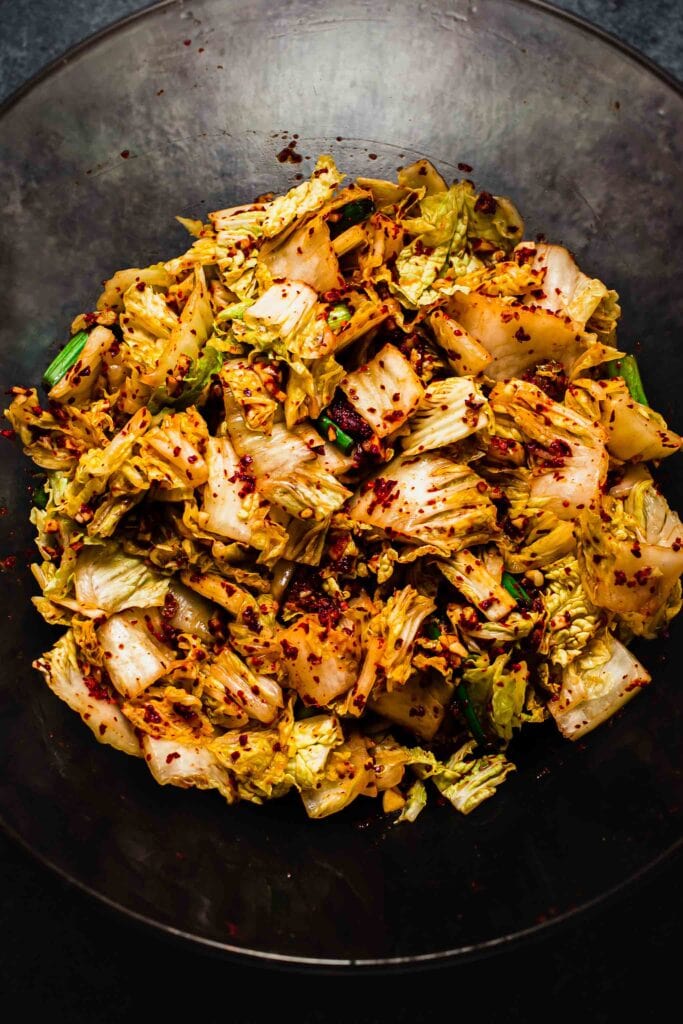
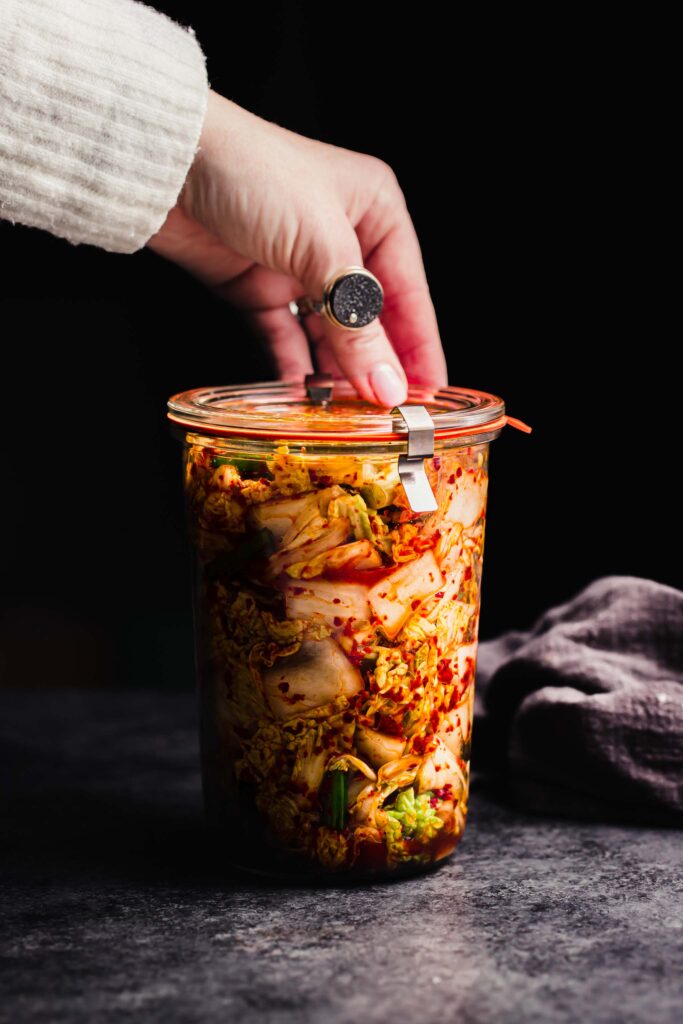
Equipment needed
You will need a couple of liter glass jars with tight fitting lids to hold the kimchi while it ferments. It’s preferable to not use plastic, as the odors from the kimchi can be hard to remove after the fermenting process. You can also use a crock like this.
Optional add-ins
- Daikon Radish – Add about 8-ounces of daikon radish that is cut into matchstick sized pieces.
- Carrots – You can add in about 8-ounces of shredded carrots.
- Garlic Cloves – Add in a few minced garlic cloves to your mixture.
Recipe FAQs
Kimchi can be eaten immediately after preparing it, however, it is usually fermented for at least a few days to a few weeks before serving, so that the flavors can develop fully. Store fermented kimchi in the fridge for up to one month. You will know when it is past its prime when it becomes overly sour and the cabbage turns mushy.
Kimchi is great for you! It’s packed with probiotics and antioxidants and is also a great source of vitamins A and C.
While they are both the same dish, kimchee is the traditional way that South Koreans spell it. While, kimchi is the standard Japanese spelling.
Kimchi is a bit like a cross between a pickle and sauerkraut. The fermentation process gives kimchi its umami, salty + sour flavors, with a bright acidity. It’s can often be quite spicy as well, depending on the type and how much Korean red pepper powder is used.
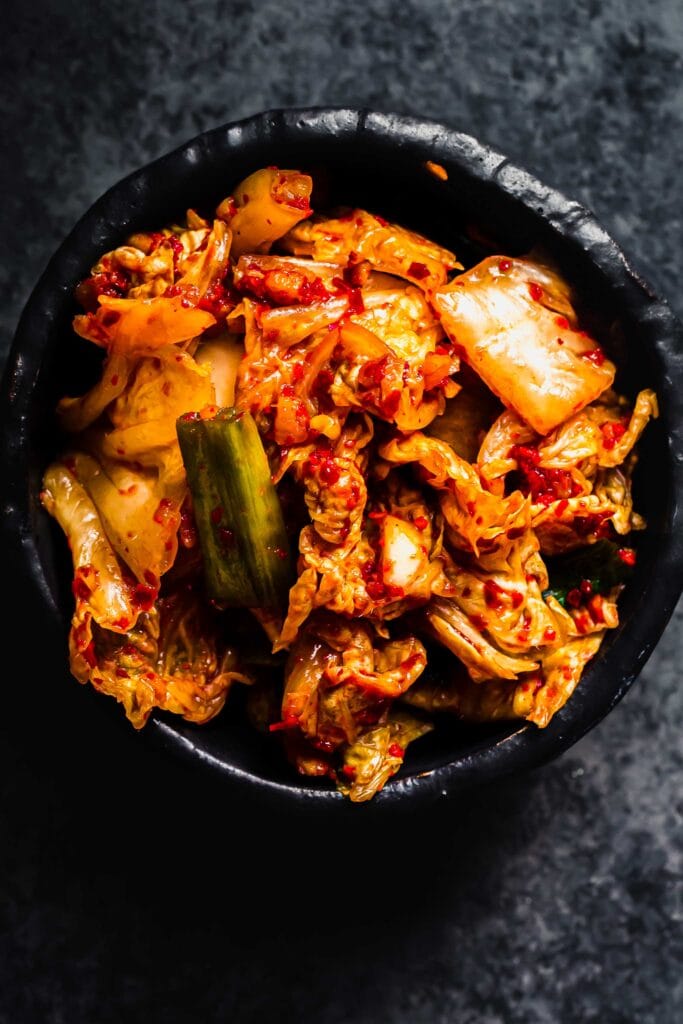
What to eat with kimchi
Wondering what to eat with kimchi? Try one of these dishes:
Plus, be sure to check out these 30+ BEST Asian Side Dishes.
Did you try this homemade kimchi recipe?
If you loved this traditional kimchi recipe I would appreciate it so much if you would give it a star review! Also, be sure to snap a picture of your finished dish and share it with me on Instagram using the hashtag #platingsandpairings and tagging me @platingsandpairings.
For more great Platings and Pairings recipes, be sure to follow me on Instagram, TikTok, Pinterest and Facebook.
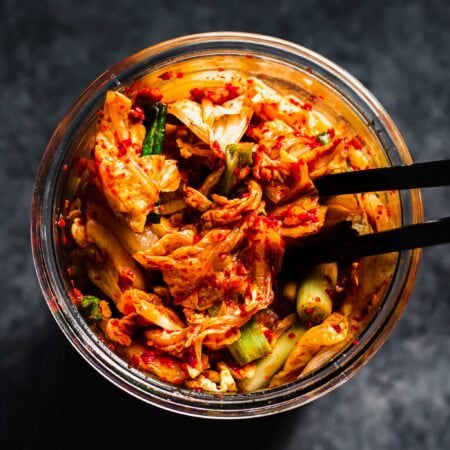
Easy Kimchi
Ingredients
- 3 pounds napa cabbage
- 1/2 cup kosher salt
- 12 cups cold water (plus more as needed)
- 4 medium scallions (ends trimmed, cut into 1-inch pieces (use all parts))
- 1/3 cup Korean red pepper powder
- 1/4 cup fish sauce
- 1/4 cup fresh ginger (minced)
- 7 cloves garlic (minced)
- 2 teaspoons dried shrimp (minced)
- 1 1/2 teaspoons granulated sugar
Instructions
- Cut the cabbage in half lengthwise, then crosswise into 2-inch pieces, discarding the root end. Place in a large bowl, sprinkle with the salt, and toss with your hands until the cabbage is coated. Add enough cold water to just cover (about 12 cups), making sure the cabbage is submerged. Cover with plastic wrap or a baking sheet and let sit at room temperature at least 12 hours and up to 24 hours.
- Place a colander in the sink, drain the cabbage, and rinse with cold water. Gently squeeze out the excess liquid and transfer to a medium bowl; set aside.
- Place the remaining ingredients in a large bowl and stir to combine.
- Add the cabbage and toss with your hands until evenly combined and the cabbage is thoroughly coated with the mixture.
- Pack the mixture tightly into a clean 2-quart or 2-liter glass jar with a tight fitting lid and seal the jar.
- Let sit in a cool, dark place for 24 hours (the mixture may bubble). Open the jar to let the gases escape, then reseal and refrigerate at least 48 hours before eating (kimchi is best after fermenting about 1 week). Refrigerate for up to 1 month.
Notes
Nutrition
This post was originally published in 2015. It was updated in 2023 to add new photos and information. The spicy kimchi recipe remains the same. Enjoy!
PS – Here’s the old images from 2015…
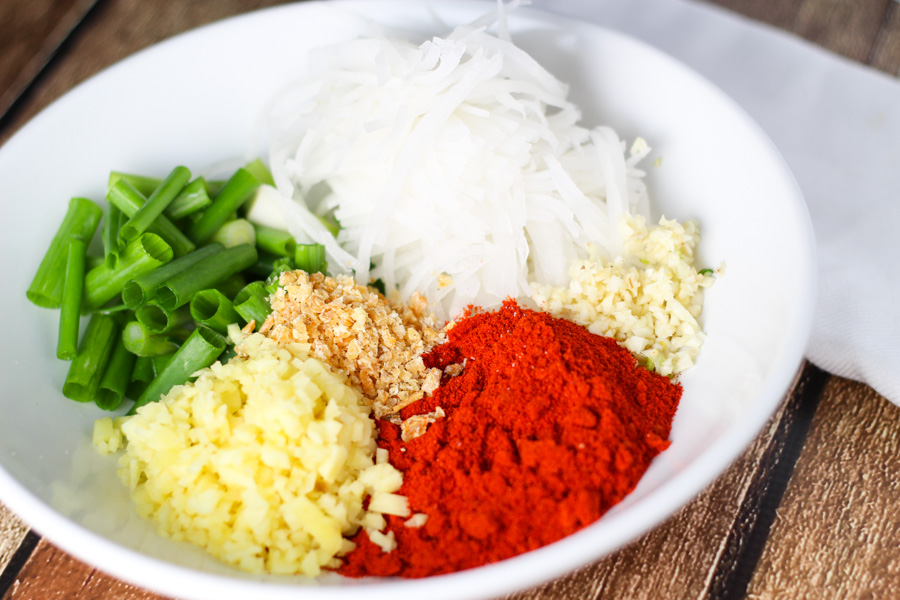
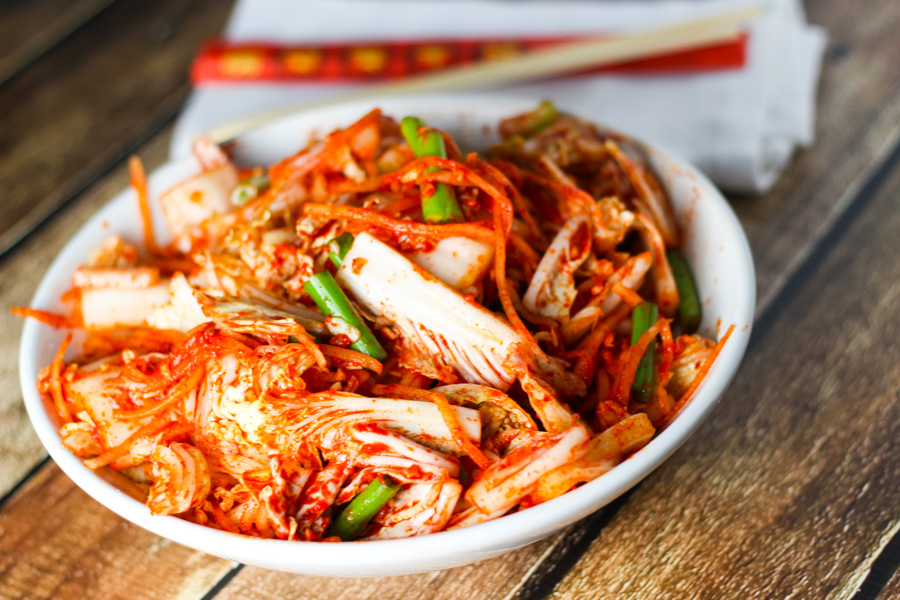
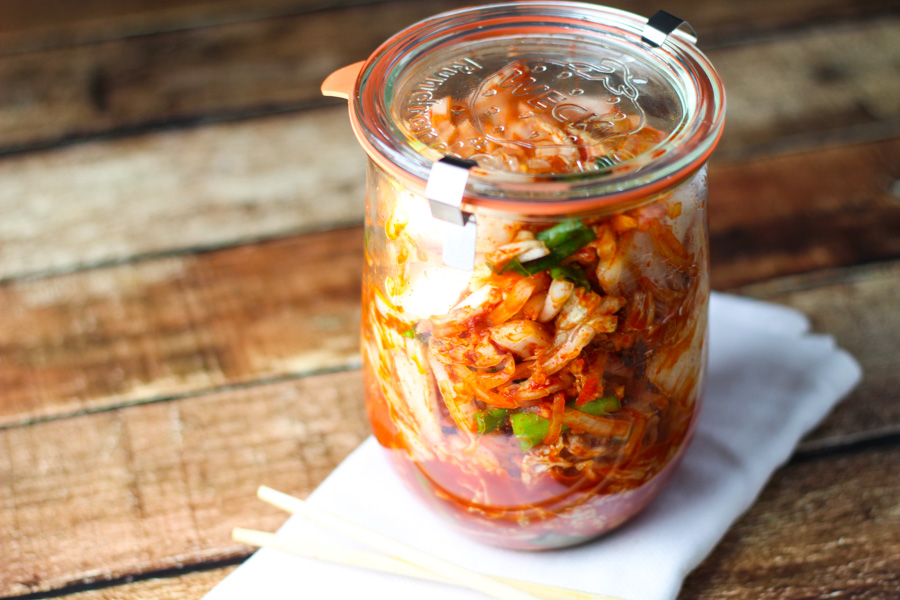







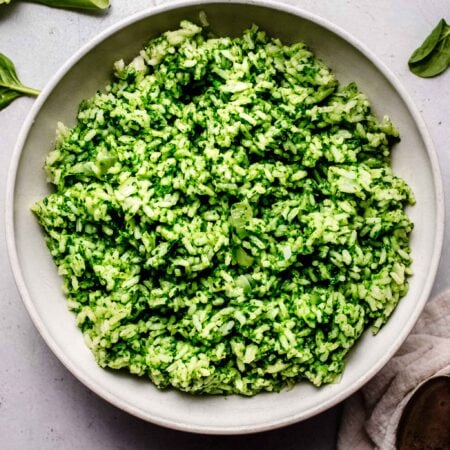
I’ve purchased kimchee at our local farmer’s market but never attempted making it myself. Maybe I will try now! It is really tasty! Thanks for the recipe!
Of course Michelle! It’s great to have kimchi on hand, and it’s really not difficult to make at all!
Recipe is great, there are so many ads I can’t see the recipe. I know it’s nothing against anyone. You’re content and recipes are AMAZING!
What a gorgeous dish Erin! So tempting. I’m a novice in Korean cooking but this does not look too complicated. We do have an Asian market close by and now I want to check it out with your ingredient list in hand…
Thank you Allie! I was surprised at how easy it is to make kimchi at home. It does take a bit of time, and a few obscure ingredients (the Korean red pepper powder & dried shrimp), but it’s easy to put together. I LOVE it on these Kimchi Tacos and these Carnitas Bowls, or just by itself!
I just made my new batch of kimchi last night. In a traditional Korean recipe, Korean radishes are used instead of daikon. It is shorter and fatter in shape; it has greater water content with a peppery taste. They are available at Korean grocery stores. It seems there are mom-n-pop k-stores everywhere. But if you live in and around one of the larger cities, check out H-Mart (http://www.hmart.com/) grocery stores. I don’t have one close to me so when I go to Chicago I always make a point of making a stop (tourist destination?) They have a food court and a bakery as well. If you are not in the mood to make your own, you can buy the ready-made store kimchi and they are delicious.
Kimchi can be enjoyed immediately after it’s been made or after fermenting for a few days. My family enjoys it both ways but my 22 year-old son will only eat it fresh.
I love kimchi but have never tried making my own – this look absolutely delicious
Thanks Heather – Cheers!
racist? couldn’t be me, hate to break it sweetie but your canceled like james charles all over again! buh bye <3
I’ve never made kimchi but am so ingtrigued now. You make it look easy. I might give it a try this weekend.
I hope you do try it Joanie – Let me know how it turns out!
I love the idea of making my own kimchee. I’ve had it frequently, but it always seemed so intimidating. Now after reading your post, I think I’m ready to make it – thanks.
You are welcome Laura – It’s really not too difficult at all. Waiting is the hardest part!
I love Kimchee and am super excited to try this. Just wondering if you have to release the gas every 24 hours if you’re letting it ferment for a full week or is that a one time thing?
Hi Netta – No need to release the gasses every day. Just the one time is great!
I love kimchi..But in country the in my country(Nigeria) the ingredient are not available…..I wish I can visit Korean again…..
Do you use all 1/2 cups of salt to brine the cabbage or do you save some for the pepper paste? I have now successfully failed at two attempts and I have read at least 30 different, yet similar versions of the recipe. Is the fish sauce supposed to be sufficient salt once the fermentation is complete?
You have great pictures and the recipe is well written. Please clarify. Thanks.
Thank you Jeanette – Yes, you will use all 1/2 cups of salt to brine the cabbage and then it will be rinsed off. The salted shrimp and fish sauce help to provide even more seasoning as it ferments. I hope this helps!
What beverage do you suggest?
Are you asking about wine pairings? I’d probably lean towards a dry Riesling. Hope that helps!
I would just add 1 technique that you aren’t really doing right.
In Korea you don’t toss the cabbage with the paste. You open the leaves and rub the paste on it. Its not a big deal but that’s how its traditionaly made..
Also you might want to put a small warning. You might to tell people to wear rubber or food prep gl9ves. Some people will have a reaction to the paste and it will make their hands feel like they are burning
Great tips Andrew – Thank you!
Andrew- you rub the paste into the leaves if you are making whole kimchi with quartered heads of cabbage. since this recipe is “mak” kimchi or “already cut” kimchi, tossing the cabbage with the paste is the only way to make sure all the cabbage gets coated evenly.
I love the idea of making homemade kimchi. This looks so delicious! I usually buy it from the store but if I can make it en masse it would be alot cheaper and I’d feel better about knowing what I was eating! Thank you for sharing your recipe, I definitely want to give this a try at home next time I ferment anything!
Of course Billy – I hope you enjoy!
Vegetarian here, is the minced shrimp absolutely necessary? This looks too good to pass up!
Hi Bel – I think that you can definitely make this without the minced shrimp. It shouldn’t make a huge difference, but you may want to add a bit of extra salt at the end…
Both my husband and I have GERD and love kimchi. Is there a way to make it without it being so spicy?
Hi Luis – You can cut way back on the Korean red pepper powder, or leave it out entirely. Hope this helps!
Hi Luis,
I used to suffer from GERD, too. I found my best cure in raw fermented foods like kimchi (without too much spice at first!). Raw fermented foods are very healing to the gut. I especially enjoy a few forkfuls on my morning eggs.
Hope this helps! 😀
Hey I’m super excited to try this recipe but one question. After everything is placed in the jars you said seal it, does that mean pressure seal it? Wasn’t sure as it also states to open it after 24 hrs.
Thanks
Hi Melissa – No need to pressure seal with the kimchi.
I made this true to the recipe, after a week I tasted it. It was abit dry, I thought it would be wetter. It was good, but shouldn’t it be moister? Should I do anything to it? Will it keep just as well?
Hi Bob – It should keep well as it is!
Hi, thanks for the recipe. Just wondering – when it says ferment up to one week does that mean out of the fridge? Or put it in the fridge after 24 hours but then don’t eat it for one week? Thanks for your help!
Hi – This means to ferment it in the fridge.
Thanks for the recipe!
I just finished making this.
I brined the cabbage for about 18 hours and rinsed it in batches. After adding the paste and tasting it, I found it to taste a bit too salty for me 🙁
I added extra radish hoping to cancel this out.
Is the kimchi prior to fermentation supposed to taste like this?
I have been reading kimchi recipes but have not attempted it yet. Your recipe looks great, and I must say that reading the Q&A have been very helpful. You have been very generous answering questions. The process of Kimchi is new to most Westerners so thank you for answering questions.
I followed your recipe to a T or rather a K for kimchi. I think it’s the best kimchi I’ve tasted. Certainly better than any store bought I’ve had. Crisp, tangy and delicious. I’m on my second batch which this time I’m storing in my new e-jen 1.7 quart container. On my second batch I food processed the garlic, onion, daikon and ginger together so that it’d distribute more evenly. My ginger pieces were too big in the first batch. Thanks again. I’m having fun making and eating this healthy probiotic dish!
I’m so glad you liked it Gerald!
Wow this is easy. And healthy too. I want to try this!
Worked out great!!!! The market I have been buying kimchi has not had on many occasions! Decided with this Coronavirus have time to do myself!!! Hot dang!!! No more wasting my money on theirs!!!! Mine way better and fresher!!!
Thanks!!!
I’m so happy to hear that you liked it Terra!
Shouldn’t this last for more than a month after preparation?
I love kimchee and eat it with almost everything! Going to try making it with your recipe instead of buying it all the time!
I hope you love it Wanda! I’ve really been enjoying it 🙂
Wrong information of Korean food. Also Japanese can’t even pronounce “Kimchi”
Hello MJ – I would love it if you could educate me a bit. I did speak with someone who is knowledgable on the subject, but if I’m wrong on the facts, I would appreciate some additional feedback. Thank you!
This looks so good! Everyone at my house will love it! Thanks for sharing….
I live in a mountain town in California where I finally found one market that sells kimchi but it is just “ok.” Using this recipe a few times I have made much better kimchi than I can find premade. Tastes great and I use it up pretty quickly as a side or in Soon Dubu mostly. Just takes a bit longer to ferment well compared to the instructions but that may be because of my altitude at over a mile high. Enjoy
Do you absolutely have to leave the cabbage sit for at least 12 hours? Or can it be less than 12 hours?
Hi Grace – It can be consumed earlier!
Everything is nice but it needs daikon radish, which I added.
I agree Pat – Daikon is a great addition!